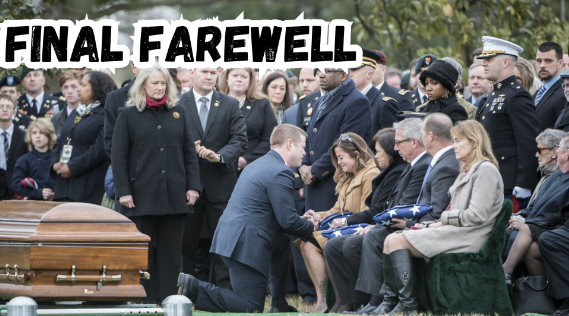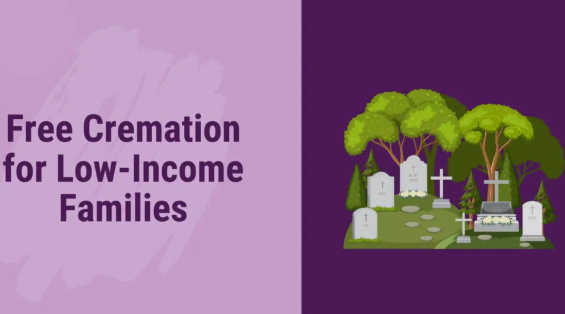Funerals are an inevitable part of life, but their costs can be overwhelming, especially for low-income families. The expenses related to funeral homes, embalming, cremation, caskets, and more can quickly add up to thousands of dollars. However, there’s hope for those struggling to afford these expenses. In this article, we’ll introduce you to 11 nonprofit organizations dedicated to providing free or low-cost cremation and burial assistance for those in need.
National Nonprofits
1. Final Farewell

Final Farewell is a national nonprofit organization that focuses on supporting families who are burying a child under the age of 18. While it is most active in the Philadelphia area, it extends its assistance across the United States. Final Farewell offers guidance, advice, and affordable ceremony options for grieving families. They can provide grants to help cover funeral costs, with the neediest families receiving all services at no cost. To qualify for aid, families must meet Final Farewell’s poverty guidelines, which are updated annually. Visit Final Farewell for more details and to apply for assistance.
2. The TEARS Foundation
The TEARS Foundation is dedicated to alleviating the financial burden of burial and cremation services for families who have lost children. They also connect families with support groups and companions who have experienced similar losses. Financial and emotional support is provided to eligible families across the United States. To apply for assistance, visit The TEARS Foundation and fill out their online application form.
3. Funeral Consumers Alliance

The Funeral Consumers Alliance is a national nonprofit organization working to advocate for fair and transparent funeral prices. They offer guidance to individuals and families seeking to make informed decisions about funeral arrangements. The organization provides publications on funeral choices, how to care for the deceased without a funeral home, and monitors funeral industry trends. Their resources are available for free online, making them accessible to all. For more information, visit Funeral Consumers Alliance.
4. Children’s Burial Assistance
Children’s Burial Assistance is a charitable organization based in Georgia but providing assistance to families nationwide. They help families with burial plots, vaults, grave liners, cremation expenses, and grave fees. To qualify, families must be in need and have a deceased minor aged 1 to 17. Assistance is offered through gifts in kind, a research database, and financial aid. Visit Children’s Burial Assistance for more information and to apply.
Government Assistance
5. Veterans Affairs
If the deceased was a veteran, Veterans Affairs (VA) may provide a monetary death benefit and reimburse funeral expenses. The maximum amount depends on the circumstances but can be up to $2,000 for service-related deaths. Eligibility criteria include honorable discharge, service-related disability, and VA pension eligibility. To apply for VA burial benefits, visit VA.gov.
6. Federal Emergency Management Agency (FEMA)

FEMA offers financial assistance to eligible families for funeral expenses, including caskets, urns, mortuary services, and more. To qualify, you must provide documentation, including a death certificate and proof of funeral costs. Apply online at FEMA.
7. Economic Security Administration Burial Assistance (Washington, D.C.)
The Economic Security Administration (ESA) in Washington, D.C., provides up to $1,000 in burial assistance. Eligibility criteria include the deceased’s financial status and residency in the district. To apply, visit the ESA website.
8. Department of Transitional Assistance
(Massachusetts)
The Department of Transitional Assistance (DTA) in Massachusetts assists low-income families with funeral and burial costs. Eligibility depends on the individual’s resources and residency. To apply for aid, visit the DTA website.
9. Temporary Assistance for Needy Families (Illinois)
The Temporary Assistance for Needy Families (TANF) program in Illinois offers financial assistance to families in need, including funeral expenses. Eligibility is based on income and other factors. To apply for assistance, visit the Illinois Department of Human Services.
10. Financial Assistance and Social Services (Native Americans and Alaska Natives)

If you are a Native American or Alaska Native and do not qualify for other assistance programs, the Financial Assistance and Social Services (FASS) can provide support for funeral expenses. Eligibility criteria include financial need and Native American or Alaska Native heritage.
If you’re unable to secure assistance from nonprofits due to eligibility or other reasons, consider crowdfunding platforms. These platforms allow individuals to raise funds from the public for various needs, including funeral expenses. Here are two popular options:
11. Deposit a Gift
Deposit a Gift is a crowdfunding platform specifically designed for funeral and memorial funding. Users can create personalized pages, set fundraising goals, and share their campaigns to gather support
12. GoFundMe
GoFundMe is a widely recognized crowdfunding platform that can be used for funeral expenses. Users can create campaigns, set fundraising goals, and share their stories with a large audience.
While crowdfunding platforms are not nonprofits, they provide a way to gather support from a wide range of donors. Keep in mind that there may be fees associated with these platforms.
Conclusion
In conclusion, there are numerous resources available to help low-income families with funeral and cremation expenses. Whether you qualify for assistance from nonprofit organizations or explore crowdfunding options, there are solutions to ease the financial burden during a difficult time. Remember to research each option carefully and reach out for help when needed.
Frequently Asked Question (FAQs)
What is the average cost of a funeral?
The cost of a funeral can vary widely depending on factors like location, type of service, and additional expenses. On average, a traditional funeral can cost between $7,000 to $12,000, including burial. Cremation services tend to be more affordable, with costs ranging from $2,000 to $4,000.
How can I find financial assistance for a funeral if I can’t afford it?
There are nonprofit organizations, government agencies, and crowdfunding platforms available to help cover funeral expenses for those in need. You can explore organizations like Final Farewell, The TEARS Foundation, FEMA, and more, as mentioned in the article above. Additionally, crowdfunding platforms like GoFundMe and Deposit a Gift can be used to seek financial assistance from the public.
What is a pre-paid funeral plan, and how does it work?
A pre-paid funeral plan allows individuals to pay in advance for their funeral expenses. These plans typically involve working with a funeral home or provider to choose and pay for specific services and merchandise. It can help ease the financial burden on surviving family members and ensure your wishes are followed.
What government benefits are available for veterans’ funerals?
Veterans may be eligible for burial benefits from the Department of Veterans Affairs (VA). These benefits may include a burial allowance, a plot in a national cemetery, and a headstone or marker. Eligibility criteria are based on factors such as honorable discharge, service-related disability, and VA pension status.
Can I use life insurance to cover funeral expenses?
Yes, life insurance policies are often used to cover funeral expenses. Beneficiaries of the policy can use the death benefit to pay for funeral and burial costs. It’s essential to inform the insurance company promptly upon the policyholder’s death to initiate the claims process and receive the funds.
Author Profile
- John Davis is a nationally recognized expert on credit reporting, credit scoring, and identity theft. He has written four books about his expertise in the field and has been featured extensively in numerous media outlets such as The Wall Street Journal, The Washington Post, CNN, CBS News, CNBC, Fox Business, and many more. With over 20 years of experience helping consumers understand their credit and identity protection rights, John is passionate about empowering people to take control of their finances. He works with financial institutions to develop consumer-friendly policies that promote financial literacy and responsible borrowing habits.
Latest entries
 BlogJuly 8, 2024How to Fast-Track Approval for Section 8 Vouchers
BlogJuly 8, 2024How to Fast-Track Approval for Section 8 Vouchers BlogJuly 8, 2024Unlock Apple Business Credit with No Credit Check Needed
BlogJuly 8, 2024Unlock Apple Business Credit with No Credit Check Needed BlogJuly 8, 2024A $18 Million Per Year Investment Plan for Democrats to Control the Texas House
BlogJuly 8, 2024A $18 Million Per Year Investment Plan for Democrats to Control the Texas House Low Income GrantsSeptember 25, 2023How to Get a Free Government Phone: A Step-by-Step Guide
Low Income GrantsSeptember 25, 2023How to Get a Free Government Phone: A Step-by-Step Guide


